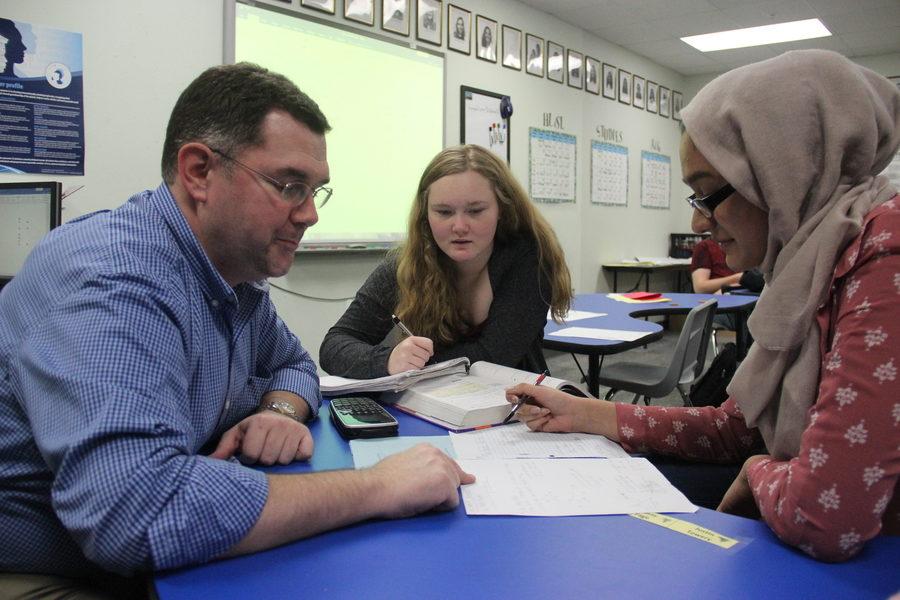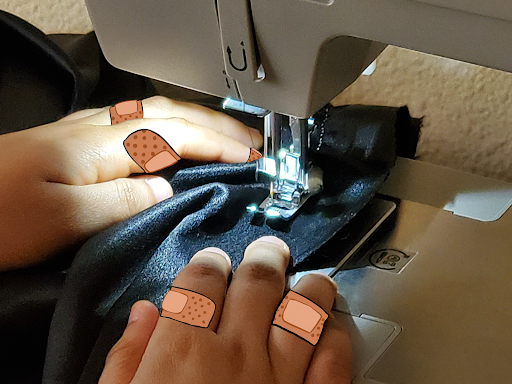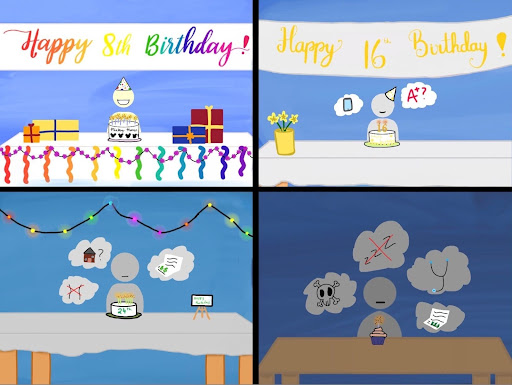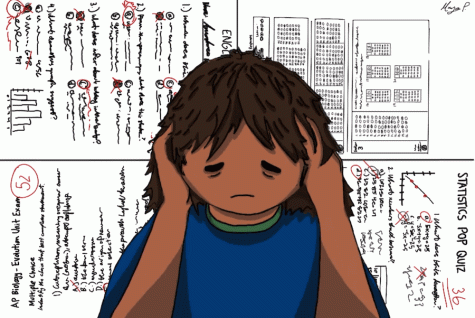Working with a team when you hate team spirit
IB Math Studies teacher Ian VanderSchee works with seniors Jess Goode and Maria Khan on their trigonometry homework. VanderSchee teaches using the flipped classroom method, where students learn the material at home through videos and can ask questions and work out problems with him during class.
As students, we often learn about teamwork and its complexities. There will always be the group leader and there will almost always be one person whose laziness drags the whole group down.
Some students really prefer working in teams and some do not. So what if you are part of the group that does not prefer to work in a team?
“Research consistently shows that teams underperform, despite all the extra resources they have,” says Diane Coutu of the Harvard Business Review. “That’s because problems with coordination and motivation typically chip away at the benefits of collaboration. And even when you have a strong and cohesive team, it’s often in competition with other teams, and that dynamic can also get in the way of real progress.”
As a freshman, I thought I knew everything. I walked into class, joked about how lame eighth graders were, and then put my head in my hands when my teacher assigned a group project to the entire class. “How could they,” I ranted to my friends. “There’s absolutely no need for it!” Cut to senior year and I have an entirely different outlook.
Thirteen percent of American citizens list team projects as their preferred teaching method, compared to 25 percent of students from Africa and the Middle East and 20 percent of Chinese students. Along with the 13 percent who do not like working in groups, I too struggle with teamwork, but there are many facets of my life where I am required to collaborate with my peers. It is the same with anyone today.
Edmond Lau, an engineer for Quara, also provides a list of reasons why teamwork is actually extremely important in the real world:
- Working alone makes it harder to get early and continual design feedback, thereby decreasing output quality.
- Working alone reduces learning.
- Working on a team increases the bus factor for a project.
- Working on a team increases accountability.
- Slower project momentum from working alone reduces morale.
- The lows of a project are more demoralizing when working alone.
- The highs of a project are more motivating when working as a team.
Working in a team functions in many ways and is an inevitable part of life; more so now than ever. Many of Coppell High School’s electives require teamwork as a basic part of the curriculum. Athletics requires students to work together to win the game. Band requires students to work together to play beautiful music. Debate requires students to research together and win tournaments.
“Group work is only beneficial if everyone in the group is dedicated towards achieving the final product,” CHS sophomore Uttami Godha said. “I personally have had experiences where I was the only one contributing to the project, yet the entire group received the same grade as me, which is a bit unfair. However, if the entire group establishes meeting times and work times in general in order to finish an assignment, then the concept of a group project can be successful.”
Teachers are also becoming more aware of some of the flaws of student-lead group work.
“I make sure that my project actually has roles for each of the kids,” AP Environmental Science teacher Madhiva Phadke said.
Phadke often utilizes team projects in order to build a sense of community within the field of science.
“I make it apparent that there are things you’re supposed to do, things you’re not supposed to do, and if you do the things you’re not supposed to do then there are consequences…those consequences end up minimally [reducing] collaboration points or sometimes emails home or to coaches. If necessary, I end up removing the kid from their group and they have to do the whole thing by themselves,” Phadke said.
While I still prefer more often to work alone, I have also learned the values of working with other motivated students in order to meet future goals. Working in a group allows for not only a greater division of the workload, but it also allows for a further depth of research and originality. Even if that does not sound appealing, it is a part of the work force. It may help to at least appreciate what it has to offer.

Grant Spicer is a Senior and second year staff writer for The Sidekick. Grant specializes in writing opinions articles and answering those difficult questions.

Kelly is a senior at Coppell High School and the General Photography Editor of the Sidekick. She is an expected diploma candidate in the International...













